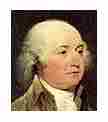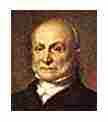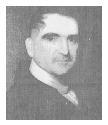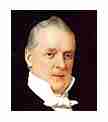Biographies - A through C
 ADAMS, John, (father of John Quincy Adams), a Delegate from Massachusetts and a Vice President and 2d President of the United States; born in Braintree, Mass., October 19, 1735; was graduated from Harvard College in 1755; studied law; was admitted to the bar in 1758 and commenced practice in Suffolk County; joined the Sons of Liberty and argued against the Stamp Act; was elected to represent Boston in the general court in 1768; Member of the Continental Congress 1774-1777; signed the Declaration of Independence and proposed George Washington, of Virginia, for General of the American Army; became a member of the Board of War, but resigned to accept appointment as commissioner to the Court of France; Minister Plenipotentiary to Holland 1782; first Minister to England 1785-1788; elected in 1788 as the first Vice President of the United States with George Washington as President; reelected in 1792 and served from April 21, 1789, to March 3, 1797; elected President of the United States and served from March 4, 1797, to March 3, 1801; delegate to the constitutional convention of Massachusetts 1820; died in Quincy, Mass., July 4, 1826; interment under the old First Congregational Church, now called the United First Parish Church.
ADAMS, John, (father of John Quincy Adams), a Delegate from Massachusetts and a Vice President and 2d President of the United States; born in Braintree, Mass., October 19, 1735; was graduated from Harvard College in 1755; studied law; was admitted to the bar in 1758 and commenced practice in Suffolk County; joined the Sons of Liberty and argued against the Stamp Act; was elected to represent Boston in the general court in 1768; Member of the Continental Congress 1774-1777; signed the Declaration of Independence and proposed George Washington, of Virginia, for General of the American Army; became a member of the Board of War, but resigned to accept appointment as commissioner to the Court of France; Minister Plenipotentiary to Holland 1782; first Minister to England 1785-1788; elected in 1788 as the first Vice President of the United States with George Washington as President; reelected in 1792 and served from April 21, 1789, to March 3, 1797; elected President of the United States and served from March 4, 1797, to March 3, 1801; delegate to the constitutional convention of Massachusetts 1820; died in Quincy, Mass., July 4, 1826; interment under the old First Congregational Church, now called the United First Parish Church.
![]()
 ADAMS, John Quincy, a Senator and a Representative from Massachusetts and 6th President of the United States; born in Braintree, Mass., July 11, 1767; acquired his early education in Europe at the University of Leyden; was graduated from Harvard University in 1787; studied law; was admitted to the bar and commenced practice in Boston, Mass.; appointed Minister to Netherlands 1794, Minister to Portugal 1796, Minister to Prussia 1797, and served until 1801; commissioned to make a commercial treaty with Sweden in 1798; elected to the State senate in 1802; unsuccessful candidate for election to the U.S. House of Representatives in 1802; elected as a Federalist to the United States Senate and served from March 4, 1803, until June 8, 1808, when he resigned, a successor having been elected six months early after Adams broke with the Federalist party; Minister to Russia 1809-1814; member of the commission which negotiated the Treaty of Ghent in 1814; Minister to England 1815-1817 and assisted in concluding the convention of commerce with Great Britain; Secretary of State in the Cabinet of President James Monroe 1817-1825; in 1825 the election of the President of the United States fell, according to the Constitution of the United States, upon the House of Representatives, as none of the candidates had secured a majority of the electors chosen by the States, and Adams, who stood second to Andrew Jackson in the electoral vote, was chosen and served from March 4, 1825, to March 3, 1829; elected as a Republican to the U.S. House of Representatives for the Twenty-second and to the eight succeeding Congresses, becoming a Whig in 1834; served from March 4, 1831, until his death; chairman, Committee on Manufactures (Twenty-second through Twenty-sixth, and Twenty-eighth and Twenty-ninth Congresses), Committee on Indian Affairs (Twenty-seventh Congress), Committee on Foreign Affairs (Twenty-seventh Congress); unsuccessful candidate for Governor of Massachusetts in 1834; died in the Capitol Building, Washington, D.C., February 23, 1848; interment in the family burial ground at Quincy, Mass.; subsequently re-interred in United First Parish Church.
[See Table of Participants]
ADAMS, John Quincy, a Senator and a Representative from Massachusetts and 6th President of the United States; born in Braintree, Mass., July 11, 1767; acquired his early education in Europe at the University of Leyden; was graduated from Harvard University in 1787; studied law; was admitted to the bar and commenced practice in Boston, Mass.; appointed Minister to Netherlands 1794, Minister to Portugal 1796, Minister to Prussia 1797, and served until 1801; commissioned to make a commercial treaty with Sweden in 1798; elected to the State senate in 1802; unsuccessful candidate for election to the U.S. House of Representatives in 1802; elected as a Federalist to the United States Senate and served from March 4, 1803, until June 8, 1808, when he resigned, a successor having been elected six months early after Adams broke with the Federalist party; Minister to Russia 1809-1814; member of the commission which negotiated the Treaty of Ghent in 1814; Minister to England 1815-1817 and assisted in concluding the convention of commerce with Great Britain; Secretary of State in the Cabinet of President James Monroe 1817-1825; in 1825 the election of the President of the United States fell, according to the Constitution of the United States, upon the House of Representatives, as none of the candidates had secured a majority of the electors chosen by the States, and Adams, who stood second to Andrew Jackson in the electoral vote, was chosen and served from March 4, 1825, to March 3, 1829; elected as a Republican to the U.S. House of Representatives for the Twenty-second and to the eight succeeding Congresses, becoming a Whig in 1834; served from March 4, 1831, until his death; chairman, Committee on Manufactures (Twenty-second through Twenty-sixth, and Twenty-eighth and Twenty-ninth Congresses), Committee on Indian Affairs (Twenty-seventh Congress), Committee on Foreign Affairs (Twenty-seventh Congress); unsuccessful candidate for Governor of Massachusetts in 1834; died in the Capitol Building, Washington, D.C., February 23, 1848; interment in the family burial ground at Quincy, Mass.; subsequently re-interred in United First Parish Church.
[See Table of Participants]
![]()
AMES, Herman Vandenburg, PhD, 1865-1935. Historian and faculty member of the History Department of the University of Pennsylvania. The Constitution was hardly a hundred years old when Dr. Ames managed to compile an entire volume of congressional proposals for its alteration, "The Proposed Amendments to the Constitution of the United States during the First Century of its Existence" - 1896 (New York: B. Franklin, reprint 1970). The Herman V. Ames Fellowship in American History is awarded in his honor.
The Virginia Resolutions of 1799, drafted by Madison and adopted January 4, 1799--and his lengthy 1799 Report to the General Assembly (adopted January 7, 1800) in explanation and support of its Resolutions of December 21, 1798--were intimately related to the famous Kentucky Resolutions drafted by Jefferson and adopted by the Kentucky Legislature on November 10, 1798. All of these Resolutions were in defense of the rights of the people and of the States, as reserved by the Constitution and expressly by the Ninth and Tenth Amendments to the Constitution, against what were considered to be the recent usurpations and abuses of power by the Federal government in various respects, chiefly through the Alien and Sedition Laws of 1798. These resolutions were not the first such protest by a legislature; in 1790, for instance, the Virginia Legislature had protested against the Federal government's assumption of the war debts of the States as being unconstitutional. Other States did not support the Virginia Resolutions of 1798, but this legislative protest helped to start the creation of public opinion in opposition to these 1798 laws with the result that their end was assured by the next election. Use of legislative protests, exemplified by Kentucky and Virginia in 1798, was moreover resorted to in the succeeding decades by the governments of various States--in New England, the North in general, the Midwest as well as in the South--in support of their own respective complaints from time to time against what they deemed to be abuses, or usurpations, of power by the Federal government, including especially the Supreme Court, in violation of the reserved rights of the States under the Constitution. These developments are recorded in detail and at length in the book, "State Documents on Federal Relations: the States and the United States", by Dr. Ames. The History Department of the University of Pennsylvania published it in 1906.
![]()
ARCHER, William Segar, second cousin once removed of Thomas Jefferson, a Representative and a Senator from Virginia; born at 'The Lodge,' Amelia County, Va., March 5, 1789; received private instruction; was graduated from William and Mary College, Williamsburg, Va., in 1806; studied law; was admitted to the bar in 1810 and practiced in Amelia and Powhatan Counties; served four terms in the State house of delegates between 1812 and 1819; elected to the Sixteenth Congress to fill the vacancy caused by the resignation of James Pleasants; reelected to the Seventeenth and to the six succeeding Congresses (January 3, 1820-March 3, 1835); unsuccessful candidate for reelection in 1834 to the Twenty-fourth Congress; chairman, Committee on Foreign Affairs (Twenty-first through Twenty-third Congresses); elected as a Whig to the United States Senate and served from March 4, 1841, to March 3, 1847; unsuccessful candidate for reelection in 1846; chairman, Committee on Foreign Relations (Twenty-seventh and Twenty-eighth Congresses), Committee on Naval Affairs (Twenty-seventh Congress); resumed the practice of law; died at 'The Lodge,' in Amelia County, Va., March 28, 1855; interment in a private cemetery at 'The Lodge.' [See Table of Participants]
![]()
 BARBOUR, James, a Senator from Virginia; born at 'Frascati,' near Gordonsville, Orange County, Va., June 10, 1775; attended the common schools; deputy sheriff of Orange County; studied law; was admitted to the bar in 1794 at Orange Court House; served several terms in the Virginia house of delegates between 1796 and 1812, serving as speaker from 1809 to 1812; Governor of Virginia 1812-1814; elected as an Anti-Democrat and State Rights candidate to the United States Senate in 1814 for the term commencing March 4, 1815; subsequently elected to fill the vacancy in the term ending March 3, 1815, caused by the death of Richard Brent; reelected in 1821 and served from January 2, 1815, to March 7, 1825, when he resigned to accept a Cabinet portfolio; served as President pro tempore of the Senate during the Fifteenth and Sixteenth Congresses; chairman, Committee on Foreign Relations (Fifteenth, Sixteenth, and Eighteenth Congresses), Committee on the District of Columbia (Seventeenth Congress); appointed Secretary of War by President John Quincy Adams and served from March 7, 1825, to May 26, 1828, when he resigned to accept a diplomatic position; United States Minister to England from May 26, 1828, to September 23, 1829; chairman of the Whig National Convention in 1839; founder of the Orange County Humane Society, established for the advancement of education; died in Barboursville, Orange County, Va., June 7, 1842; interment in the family cemetery.
[See Table of Participants]
BARBOUR, James, a Senator from Virginia; born at 'Frascati,' near Gordonsville, Orange County, Va., June 10, 1775; attended the common schools; deputy sheriff of Orange County; studied law; was admitted to the bar in 1794 at Orange Court House; served several terms in the Virginia house of delegates between 1796 and 1812, serving as speaker from 1809 to 1812; Governor of Virginia 1812-1814; elected as an Anti-Democrat and State Rights candidate to the United States Senate in 1814 for the term commencing March 4, 1815; subsequently elected to fill the vacancy in the term ending March 3, 1815, caused by the death of Richard Brent; reelected in 1821 and served from January 2, 1815, to March 7, 1825, when he resigned to accept a Cabinet portfolio; served as President pro tempore of the Senate during the Fifteenth and Sixteenth Congresses; chairman, Committee on Foreign Relations (Fifteenth, Sixteenth, and Eighteenth Congresses), Committee on the District of Columbia (Seventeenth Congress); appointed Secretary of War by President John Quincy Adams and served from March 7, 1825, to May 26, 1828, when he resigned to accept a diplomatic position; United States Minister to England from May 26, 1828, to September 23, 1829; chairman of the Whig National Convention in 1839; founder of the Orange County Humane Society, established for the advancement of education; died in Barboursville, Orange County, Va., June 7, 1842; interment in the family cemetery.
[See Table of Participants]
![]()
BROCKENBROUGH, William, Judge of the Virginia Superior Court, second son of Dr. John Brockenbrough and Sarah Roane Brockenbrough, born July 10, 1778 in Essex, Virginia. Nephew of Judge Spencer Roane. Married Judith Robinson White, 1806. One child, John White Brockenbrough. Died 10 Dec 1838, Richmond, Virginia. (Grayson County, Virginia Superior Court Order Book 1809-1821) --- all we have on him ---
![]()
 BUCHANAN,
James, a Representative and a Senator from Pennsylvania and 15th President of the United States; born at Cove Gap, near Mercersburg, Franklin County, Pa., April 23, 1791; moved to Mercersburg, Pa., with his parents in 1799; was privately tutored and then attended the village academy; was graduated from Dickinson College, Carlisle, Pa., in 1809; moved to Lancaster, Pa., the same year; studied law; was admitted to the bar in 1812 and practiced in Lancaster; was one of the first volunteers in the War of 1812 and served in the defense of Baltimore; member, State house of representatives 1814-1815; elected to the Seventeenth and to the four succeeding Congresses (March 4, 1821-March 3, 1831); chairman, Committee on the Judiciary (Twenty-first Congress); was not a candidate for renomination in 1830; one of the managers appointed by the House of Representatives in 1830 to conduct the impeachment proceedings against James H. Peck, judge of the United States District Court for the District of Missouri; Minister to Russia 1832-1834; elected as a Democrat to the United States Senate to fill the vacancy caused by the resignation of William Wilkins; reelected in 1837 and 1843 and served from December 6, 1834, until he resigned on March 5, 1845, to accept a Cabinet portfolio; chairman, Committee on Foreign Relations (Twenty-fourth through Twenty-sixth Congresses); Secretary of State in the Cabinet of President James Polk 1845-1849; Minister to Great Britain 1853-1856; elected as a Democrat President of the United States in 1856 and served from March 4, 1857, to March 3, 1861; retired to his home 'Wheatland,' near Lancaster, Pa., where he died June 1, 1868; interment in Woodward Hill Cemetery, Lancaster, Pa.
BUCHANAN,
James, a Representative and a Senator from Pennsylvania and 15th President of the United States; born at Cove Gap, near Mercersburg, Franklin County, Pa., April 23, 1791; moved to Mercersburg, Pa., with his parents in 1799; was privately tutored and then attended the village academy; was graduated from Dickinson College, Carlisle, Pa., in 1809; moved to Lancaster, Pa., the same year; studied law; was admitted to the bar in 1812 and practiced in Lancaster; was one of the first volunteers in the War of 1812 and served in the defense of Baltimore; member, State house of representatives 1814-1815; elected to the Seventeenth and to the four succeeding Congresses (March 4, 1821-March 3, 1831); chairman, Committee on the Judiciary (Twenty-first Congress); was not a candidate for renomination in 1830; one of the managers appointed by the House of Representatives in 1830 to conduct the impeachment proceedings against James H. Peck, judge of the United States District Court for the District of Missouri; Minister to Russia 1832-1834; elected as a Democrat to the United States Senate to fill the vacancy caused by the resignation of William Wilkins; reelected in 1837 and 1843 and served from December 6, 1834, until he resigned on March 5, 1845, to accept a Cabinet portfolio; chairman, Committee on Foreign Relations (Twenty-fourth through Twenty-sixth Congresses); Secretary of State in the Cabinet of President James Polk 1845-1849; Minister to Great Britain 1853-1856; elected as a Democrat President of the United States in 1856 and served from March 4, 1857, to March 3, 1861; retired to his home 'Wheatland,' near Lancaster, Pa., where he died June 1, 1868; interment in Woodward Hill Cemetery, Lancaster, Pa.
![]()
BUCK, Charles, 17??- 1825?
In 1818 Charles Buck was asked to become the Consul General for the Free and Hanseatic City (Freie und Hansestadt) of Hamburg. He had asked Congress in January if he could have their permission to take the post. Congress sent the question into a committee.
Secretary of State John Quincy Adams responded to him with this letter: [image]
|
21 March Charles H. Buck Feby 11th
Sir, J. Q. A. |
We can assume from this reply that the committee realized they couldn't promise anything. In 1825, a Congressman asks for a special Act to lift duties on certain ships arriving from Germany over a period of a couple of weeks in memoriam to Charles Buck, who had died. So, we see that Buck took the job in Germany anyway.
![]()
Coalter, John (1750-1837) was for many years Judge of the Supreme Court of Appeals of Virginia, and one of the most prominent men of his day. His first wife was Miss Frances Tucker, and by this marriage he had two children, St. George and Elizabeth Tucker. From a letter of President John Tyler to Judge Coalter, "In my recent public course," Tyler explained to his fellow Virginian, "no other motive has governed me but a desire to uphold the Constitution and the laws, and to restrain executive power already grown too great, within the limits which they prescribe." Tyler to John Coalter, May 29, 1834, Tyler Family Papers.
![]()
CRAWFORD, William Harris, a Senator from Georgia; born in Nelson County, Va., February 24, 1772; moved with his father to Edgefield District, S.C., in 1779 and to Columbia County, Ga., in 1783; pursued classical studies in a private school and in Richmond Academy, Augusta, Ga.; studied law; was admitted to the bar and commenced practice in Lexington, Ga., in 1799; appointed to prepare a digest of the laws of Georgia in 1799; member, State house of representatives 1803-1807; elected to the United States Senate to fill the vacancy caused by the death of Abraham Baldwin and served from November 7, 1807, to March 23, 1813, when he resigned; served as President pro tempore of the Senate during the Twelfth Congress; declined the portfolio of Secretary of War tendered by President James Madison in 1813; Minister to France 1813-1815; returned home to act as agent for the sale of the land donated by Congress to Lafayette; appointed Secretary of War by President Madison in August 1815; transferred to the Treasury in October 1816, and served under Presidents Madison and James Monroe until 1825; unsuccessful Democratic candidate for President of the United States in 1824; due to illness refused the tender of President John Adams that he remain Secretary of the Treasury; returned to Georgia and was appointed judge of the northern circuit court in 1827, which position he held until his death in Oglethorpe County, Ga., September 15, 1834; interment on his estate, 'Woodlawn,' near Crawford, Oglethorpe County, Ga.
|
This Internet Presentation is Copyright 13th-amendment.org
Documents presented on this site are the property of their respective authors as
credited.
Please contact them for reprint permissions. contact
[Project 13 Email] |